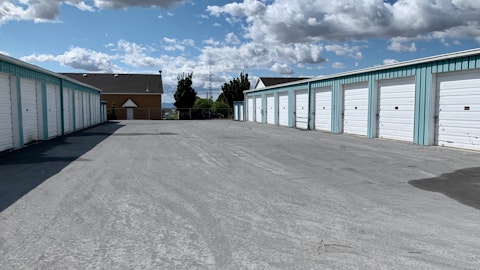Steve Sakwa: Great. Thanks. That’s it for me.
Operator: Our next question comes from John Kim with BMO Capital Markets. Please go ahead.
John Kim: Thank you. I just wanted to clarify two items mentioned on this call in my one question. Alex, I think you mentioned that you’re expecting new lease growth rates at minus 4.5%, but renewals at positive four. And I’m just wondering how sustainable that is, especially when you have lost lease at around 1%. And then for Ric and Keith in your response to Haendel’s question on occupancy, I just wanted to clarify that you are okay operating at or below 95% of the time being, there’s no immediate focus to get it above 95%.
Alex Jessett: So on the – yes, go ahead.
Keith Oden: Yes, I’ll do – I’ll take the occupancy first and then give it back to Alex. The – yes, and so in light of the fact that we our guidance for the fourth quarter included, occupancy of our prior guidance before we just issued revised guidance had an occupancy rate being flat at about 95.6%, 95.7%, that was our expectation. We’re at 94.9% as we closed out October. So no, we’re not good with operating at 94.9%. The target that we set was 95.6%, and we’d like to get back to that as quickly as possible, but we’re not. So we’re not going to make silly decisions on our either new leases or our renewal rates in order to achieve that. It just doesn’t make sense. But yes, within the limits of the levers that we can pull and still get back to 90 – mid-95s, that would be our preference.
Alex Jessett: And then to your question on whether or not we think that the new leases and renewals that we have in our guidance for the fourth quarter is sustainable. Obviously, we’re sitting here today almost to November, and keep in mind that if you’re doing a renewal, you’re typically signing that renewal a month to two months ahead of time. And new leases are typically call it 15 days to 20 days ahead of time. I think we feel very confident about these rates for the quarter.
John Kim: My question was more on the spread between the renewal and new lease 850 basis points.
Alex Jessett: Yes. 850 basis points is historically a little wide, but it’s not completely out of the realm of where we have operated at points in time. So I think we can – think we can maintain that.
John Kim: Okay. Thank you.
Operator: Our next question comes from Rich Anderson with Wedbush. Please go ahead.
Rich Anderson: Hey, thanks. Good morning. So I wonder if all of this noise in the system could create an opportunity for you. I imagine you guys are managing the skip and evic [ph] process a lot better than your neighboring peers and you’re managing supply better. Ric, you said something about, well, maybe consumer behavior settles down within the next six months, not that there’s distress, but you’re obviously a premier operator in your markets, particularly relative to your private competition. Do you think that there could be an opportunity to step in where people are perhaps a little bit less prepared or ill prepared to handle these stresses and that, despite what Steve said about you’re probably not going to buy anything, maybe you start buying stuff in a little bit more aggressive fashion as we get into the latter part of next year?
Ric Campo: Well, it’s an interesting question, Rich, for sure. Welcome back, by the way. And bottom-line is – capital allocation is an interesting thing. And we look at what the most opportune – we try to figure out what the most opportune investment strategy is, and we’ll try to execute that. Right now there really is, even with the transactions that are going on today. Deals are still trading at five and a half or five and a quarter. And so there isn’t a lot of distress in the marketplace today. And so I think you have had a sort of a narrowing of the gap between the buy – the bid and the ask. And it’s definitely been coming from primarily the sellers and not the buyers. But there is a big wall of capital that continues to be out there waiting for that some more clarity on what is the long-term tenure going to look like?
Is the Fed done? How’s supply impacting all these uncertainties that we have in the market today? And that wall of capital is just sitting there waiting. And so the question will be, will there be distress? And it’s hard to say, I mean, the deals that are blowing up today and there are plenty of deals blowing up today are really C-minus transactions that were over leveraged. All with floating rate that that were properties that I would never want to take you on a property tour to do, because I wouldn’t want you to be in that part of town and so – and I wouldn’t want to be there either. And so those are the deals that are blowing up and those are not our type of properties, okay. And so there is really no stress in the investment grade market today and we’ll see if there happens in the future, but right now there’s just no opportunity there.
Rich Anderson: Okay. And then the 16% supply impacted portfolio, how do you marry that with where you’re seeing this skip and evict situation? Is there any meaningful like shared markets or is the skip and evict issue sort of more of an overall portfolio phenomenon for the sort of located anywhere in particular?
Ric Campo: Yes. Skip and evict is highly concentrated in the markets that continue to have that had the worst COVID regulatory restrictions against pursuing…
Rich Anderson: [indiscernible]
Ric Campo: Yes, California, DC Proper, Montgomery County. Atlanta for a different reason, but that’s prime we’ve talked about on the last call, but that’s primarily kind of a localized fraud – infestation of fraudsters. But if you took those four, I think Rick gave the number in California alone, there are bad debts which is tied directly to the skip and evict question, it’s almost of our 140 basis points. California alone is almost 30 basis points of that. So it’s not – that’s not a generalized problem. The supply, I would say is generalized. It’s better in some places, worse than others, but we’re in markets that everybody that people want to move to, people want to do business in and people want to build apartments in.





